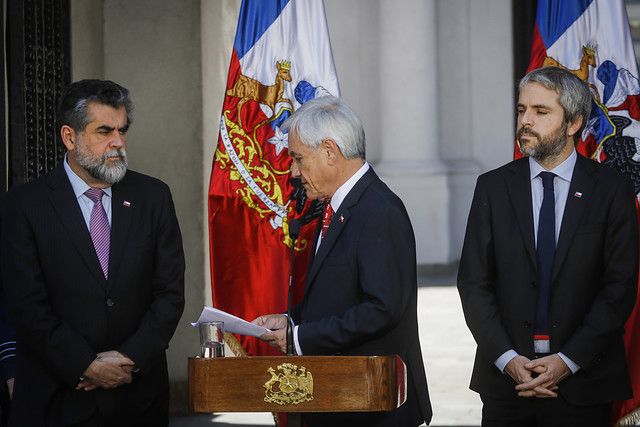From the Social Agenda to the Repression Agenda: Sebastián Piñera Takes Refuge in the Hard Right

by Joaquín Hernández / translated by A.B. Silvera
Following the publication of the latest Pulso Ciudadano ('Citizen's Pulse') poll, in which Sebastián Piñera held a 9.1% approval rating, the embattled chief executive has decided to move on from his weak and uninspired "Social Agenda" to an actual repression agenda. He will now introduce a number of legislative items in Congress which aim to criminalize the wearing of hoods and building of barricades during protests, as well as harsher sentences for looting. This is accompanied by the creation of a team dedicated to "preventive intelligence" and "citizen's complaints", which seek to stop demonstrations and highway pickets.
And that's not all: as I write this, Piñera waits to meet the other members of COSENA (the National Security Council), a body created in the 1980 constitution which, according to the 2005 constitutional reform, is meant to exist merely as a "consulting" entity. It brings together the presidents of all three government branches, the Comptroller General, and the four commanders-in-chief of the Armed and Order Forces. Thus, the state powers and martial forces are represented equally at the same table, in perfect 50-50 proportion. Nothing could be further from democracy, or arouse greater suspicion.
We should ask ourselves: Why has Piñera decided to do this? For starters, it would be ridiculous to declare this the beginning of a turn towards repression. This government has already murdered at least five people, injured thousands, and almost two hundred individuals have lost the use of one eye due to the indiscriminate firing of rubber bullet rounds directly at their faces.
Even so, Piñera's decision pursues two aims. Firstly, he seeks to use legal instruments to toughen up the persecution and detention of protesters, in the hopes it will subdue or exhaust the protest movement. Secondly, however, it is an overture to the hardest of the nationalist hard right who, as indicated by his 9.1% approval rate, have withdrawn their support for him. This move aims to please that sector and, even more dangerously, to serve as a call to action for the most hard-right, conservative and pro-fascist fringe. He wants to convey the image of a president that "has not lost control", and who is ready to put an end to the popular uprising, no matter the cost.
Regarding COSENA, the man who is still president seeks to "receive" advice which will enable him to further harden his position. This will be done in the name of national security and public order, the same arguments he has already used to justify sustained repression of dissent. Finally, he hopes to foster fear when, eventually, the army is back on the streets.
From this perspective the outlook appears grim and pessimistic, but that is only one way of reading the situation. It is clear that this turn (even further) rightward with his "Repression Agenda" is symptomatic of Sebastián Piñera's government's inability to placate the tireless will of the people to fight for their rights and demands. This will is sustained even when shot in the eye, even with the army on the streets, even after enduring random searches of civilian vehicles, and even when the army resorts to torture and sexual assault. None of this has put a dent on the people's unwavering thirst for justice and a better tomorrow. Piñera could declare a dictatorship tomorrow (and I don't doubt this is a possibility), but he will never be able to return the population to the state of lethargy it was in before this past October. Sadly for him, one cannot "roll back the wheel of history."
